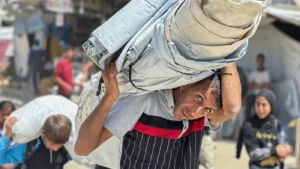‘Staggering like torn rags’: No respite for Palestinians as Israel crushes Khan Younis

Palestinians carry their belongings after Israel ordered residents to flee Khan Younis, southern Gaza, 19 May 2025
Ahmed Abu Artema writes in Middle East Eye on 26 May 2025 :
The Israeli army last week posted on social media an announcement, in Arabic, ordering residents to leave Gaza’s Khan Younis area ahead of an “unprecedented attack”.
The statement, which ordered Palestinians to flee westwards towards al-Mawasi, said Khan Younis would thenceforth be considered a “dangerous combat zone”. The order was accompanied by a map of the neighbourhoods of Khan Younis, most of which were shaded in red, and an arrow pointing towards the Mawasi “humanitarian zone”.
Moments after the warning was posted, the streets filled with tens of thousands of people wandering aimlessly. My friend, the journalist Saleh al-Natour, said what he witnessed that day was difficult to describe.
“I saw pain and oppression walking once again in human form through this city,” Natour told me. “They were fleeing in groups, from east to west, like an endless human flood … exhausted, frail bodies staggering like torn rags, covered in the dust of the surrounding destruction.
“I heard people rambling in the streets, not knowing what to say or where to go,” he added. “Hungry and thirsty, they searched for water and collapsed in the streets from exhaustion and fear.”
Natour said many people were “crammed into narrow areas” as Israeli warplanes flew above them: “People are running through the streets with the planes overhead.”
Streets ‘choked with anguish’
One scene captured on video showed a young man pushing a wheelchair for a disabled child. Around his neck hung a small bag, while another bag was strapped to his back, and in his hand he carried a plastic bag with two loaves of bread. In the middle of a road torn up by a previous Israeli incursion, and under the blazing sun, the young man’s strength gave out. He stopped pushing the wheelchair and sat down in the middle of the road.
Beside him was a woman wearing a prayer gown, the kind Palestinian women in Gaza usually throw on quickly when there’s no time to change clothes. Holding a blanket in her hand, she approached the young man – perhaps her son or brother – and reached out, trying to help him rise.
She gasped through her sobs, her words mixing with her tears: “We are dying. If they killed us, it would be more merciful. We’re exhausted, exhausted. We are not animals. We are human beings.”
